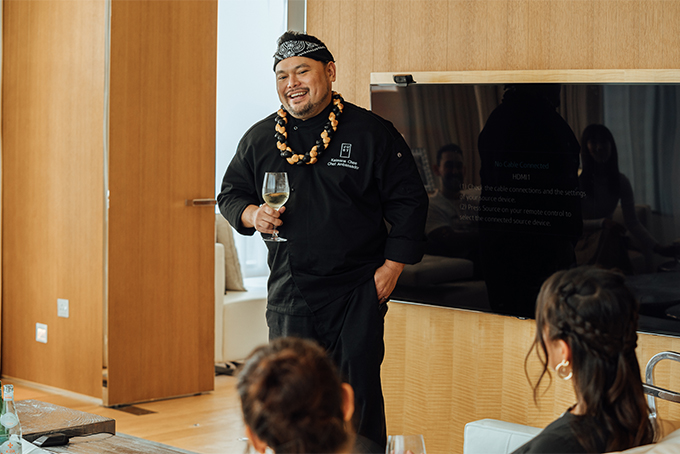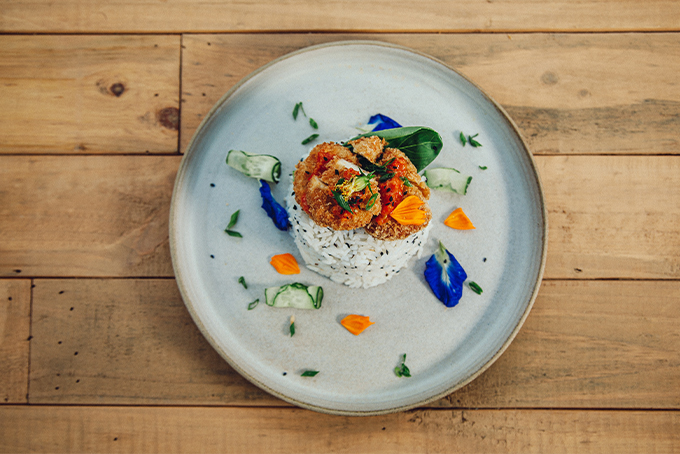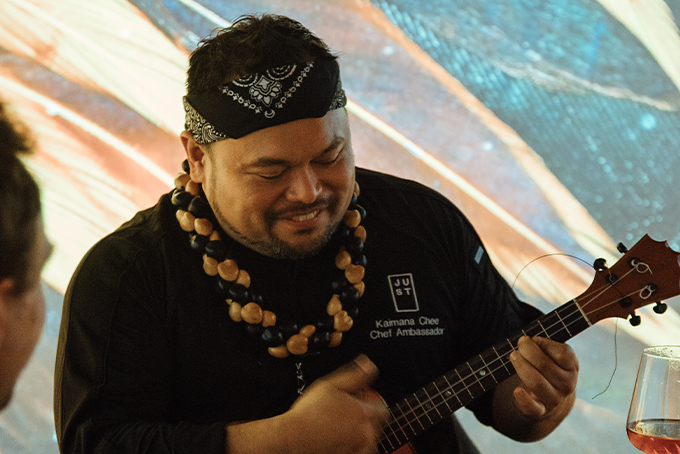It was January when Chef Kaimana Chee finally got the call he’d been expecting. Eat Just was on the line—could he come to Singapore? It was time to cook, do press, and host dinners. He hopped on a plane and flew across the world. Two weeks later, he emerged from quarantine, and that night he served his first dinner at private members’ club 1880.
It was an immersive eating experience; a projected film flickered on the walls around the table. Per restrictions, there were eight diners seated around the table. Their dishes had dreamy titles like The Forest Floor, The Flooded Future, and Fields of Corn. Later courses consisted of food that incorporated Eat Just’s in-vitro cultured GOOD Meat, like waffles and fried chicken, and sesame chicken served atop a fluffy bao.
By the time the last course was served, Chef Kaimana, overwhelmed by emotion, had started crying. “It was a culmination of so much hard work,” he explains to Vogue Singapore in a June interview. “I didn’t fathom that I’d see that during my tenure with Eat Just. I thought maybe I’d be gone from the company. Or maybe it’d be the next generation [that did it]. But not us.”

It’s been a long road for the chef. The oldest of nine kids, he grew up in a small town on the north shore of Oahu, Hawaii. His large family, with a blended heritage of Hawaiian, Filipino, Samoan, and Chinese, lived on a farm self-sufficiently. By the time he was nine, Kaimana was fishing, cleaning, cooking, and killing the animals they raised: pigs, ducks, and chickens. Food was a passion of his, but this was the eighties, and being a chef wasn’t considered by many to be a legitimate career.
“The reaction to the food—from the children to the billionaires—was exactly the same. It made people smile. It made people laugh. It made people reminisce…”
So, after college in Idaho, he set off to do something else. A decade ago, Kaimana was the director of IT training for an NGO based in Washington, D.C. He rolled out user adoption strategies to implement software and systems across the world. He loved what he did, but cooked as a side hustle. There was a food truck to run and classes at a small culinary school to teach. Then, in 2011, he won the opportunity to audition for the third season of MasterChef.
Though he wasn’t selected to move forward past the first round of eliminations, simply being one of the top 100 contestants was enough to convince him to make a go of it. More reality TV appearances followed, as Kaimana competed on Guy’s Grocery Games and won an episode of Cutthroat Kitchen. By 2016, he was able to open his own restaurant, Uncle’s Hawaiian Grindz, serving modern Hawaiian fare. That year was also when he signed up to work with Eat Just, then a burgeoning food tech company testing prospective plant proteins. They were looking for a chef who could be an ambassador for their new products. He’d cook at trade shows and food conferences, for potential investors and manufacturers. He’d visit somewhere in the neighborhood of 40 countries in five years.



In 2016, Eat Just wasn’t yet culturing meat in labs. Back then, Kaimana’s job was to promote JUST Mayo, JUST Ranch and, later, JUST Egg, a plant-based egg made from mung beans. It took him everywhere, from one way of life to another in the blink of an eye. In 2017, he went to Liberia to launch a nutrition-heavy porridge for kids. Driving out to a slum called West Point, Kaimana and Eat Just’s CEO, Josh Tetrick, hosted a concert and soccer match. They fed 3,000 kids that day. Two weeks later, Kaimana was in Sentosa, cooking for HSBC’s top clients, a hall of dozens upon dozens of millionaires and billionaires.
“The crazy thing to me, my Oprah “aha!” moment, was that the reaction to the food—from the children to the billionaires—was exactly the same,” he remembers. “It made people smile. It made people laugh. It made people reminisce, you know, it brought out emotion.”
It made him realise the responsibility he had as a chef, to be a shepherd to one of the few institutions in life that connects all cultures. “All people, no matter their race, religion, socio-economic standing, we have the power to make them smile and feel content, through the magic of food,” Chef Kaimana says. “I know that sounds so corny, but it’s the truth. Right? It’s one of the few things in the world that connects us all.”

Eat Just applied to market and distribute their chicken nugget, which is 71 percent chicken cells (the rest of it is the company’s proprietary plant-based blend), around two years ago. Singapore’s regulations were meticulous. The company had to prove the chicken was safe and nutritious for human consumption to a panel of experts in medicine, toxicology, allergenicity, cell biology, and food safety. In other words, the nuggets had to pass rigid muster—the right size, the right weight, breaded and fried just so to legally qualify as poultry.
Then, at the end of last year, Singapore approved the nugget. This came as a very pleasant shock to Kaimana. He describes the company’s rapid commercial introduction of the chicken as like having to build the plane mid-flight. Launch events were scheduled, marking the first time the cultured chicken was served in commercial settings. The first, held on 19 December, coincidentally fell on Kaimana’s birthday.
The world-firsts continue to rack up, from home-delivery out of the kitchens of Madame Fan at South Beach’s J.W. Marriott, to the breaking ground of a new factory, which Eat Just hopes to complete by next December. And the future looks very, very bright.
Eat Just is in the process of submitting other forms of chicken, like a breast, for approval. They’ve signed an agreement with one of the premiere wagyu farming families in Japan, to take cells from their cows back to headquarters in San Francisco. They’re working on getting nugget approval in other countries. Chef Kaimana calls it an iterative process, like in the tech world where new versions of software are eternally being rolled out—Just Egg, for example, is on version three. In the meantime, Kaimana is focusing on what he does best: cook, tell stories, and spread joy.

And no, he’s not vegan. Though he’s introduced more plant-based fare into his diet since starting at Eat Just, Kaimana hasn’t gone a hundred percent meatless—he still owns Uncle’s Hawaiian Grindz, after all, which serves meat as part and parcel of its Hawaiian menu. “We don’t ever have to sacrifice progress for perfection,” he says. It’s not Eat Just’s mission to make everyone a vegetarian; they know the demande for conventional meat is never going to go away.
In fact, that’s why they’re working on developing the cultured meat field, as opposed to just plant-based substitutes, which would be infinitely easier. But it’s not about doing the easy thing. It’s about doing the right thing, and remembering why you do it. For Chef Kaimana, it’s where he came from. “The foundation is being from a big family. The kitchen and the food was the focal point of our home, like in a lot of cultures,” he says. “Growing up in that Polynesian, mixed-Asian culture, the kitchen is where everybody is happy and working together. And I think that that’s the foundation of food.”





